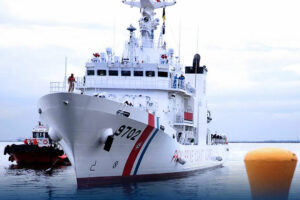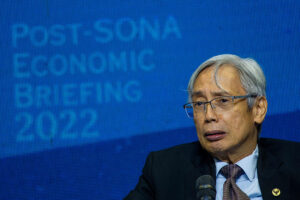Japan eyes better Philippine Coast Guard equipment

By Alyssa Nicole O. Tan, Reporter
JAPAN wants to boost coast guard and security cooperation with the Philippines, Japan’s Ministry of Foreign Affairs said in a statement on Tuesday.
Japan Foreign Affairs Minister Hayashi Yoshimasa had also sought “asset reinforcement and capacity enhancement” of the Philippine Coast Guard, the agency said on its website, citing a phone call between the Japanese official and his Philippine counterpart, Enrique A. Manalo.
“In response, Secretary Manalo expressed his appreciation for Japan’s cooperation thus far and willingness to strengthen cooperation in the aforementioned fields,” according to the statement.
Both agreed to advance working-level consultations on improved cooperation such as in exercises between the Self-Defense Forces and Armed Forces of the Philippines.
“We both reaffirmed the strong and mutually beneficial Philippine-Japan strategic partnership and committed to continue our vibrant cooperation on maritime issues, trade and economy, infrastructure development and other areas,” Mr. Manalo separately tweeted on Tuesday.
Meanwhile, defense experts said an alliance with its neighbors is the Philippines’ strongest strategy against China’s militarization of the South China Sea.
“Although diplomacy and the peaceful settlement of disputes are important, the Philippine government must not allow any state to circumvent international law and threaten the country’s national security,” Stratbase ADR Institute President Victor Andres Manhit told a forum.
“The new administration should prioritize the development of policies that will allow the country to step up and strategically work with allies and partners to ensure that international laws, treaties and agreements in the preservation of a rules-based international order are being strictly followed,” he added.
The forum in Manila was held on the sixth anniversary of a United Nations-backed tribunal’s ruling that voided China’s claim to more than 80% of the waterway.
Mr. Manhit renewed the call for the government to uphold its sovereignty and territorial integrity.
The South China Sea, a key global shipping route, is subject to overlapping territorial claims involving the Philippines, China, Brunei, Malaysia, Taiwan and Vietnam. Each year, trillions of dollars of trade flow through the sea, which is also rich in fish and gas.
Former Philippine Foreign Affairs Secretary Albert F. del Rosario said the Marcos government would have to deal with China.
“In the contest between China and the US in terms of real allies… I go back to the belief that China is out to devastate… the rules-based order,” he told reporters on the sidelines of the forum. “They’re out to demolish the rule of law.”
“For those who believe in the rule of law and rules-based order, we should… get together with our allies, stay together and stay strong,” he said.
Philippine Ambassador to the US Jose Manuel G. Romualdez, on the other hand, said the Philippine position remains the same. “We want to solve issues peacefully and in keeping with international law.”
President Ferdinand R. Marcos, Jr. seems to be working in such a way that the Philippines would benefit from both China and the US, as well as from allies like Japan, the EU and Australia, said Murray Hiebert, director for research at Bower Group Asia and a senior associate at the Center for Strategic and International Studies. “Economic and diplomatic costs” might be inevitable to stop China’s “aggressive behavior,” he told the forum. John Blaxland, an intelligence studies professor from the Australia National University, said China is taking advantage of the Philippines’ desire to remain neutral.
“You are being the victims of exploitation by a China that is throwing its weight around understandably to grind economic and military power,” he said at the forum. The Philippines needs to be more “hard-nosed about its interests.” Ex-President Rodrigo R. Duterte led a foreign policy pivot to China away from the US when he took office in 2016 in exchange for investment pledges, most of which have never materialized. “The Philippines has to find a way to balance this very tense environment between China and the United States,” Mr. Hiebert said.
Lisa Curtis, director of the Indo-Pacific security program of the Center for a New American Security, said the Philippines should be “subtle about how they address China’s assertiveness,” noting that it must always remain nuanced and clever.




